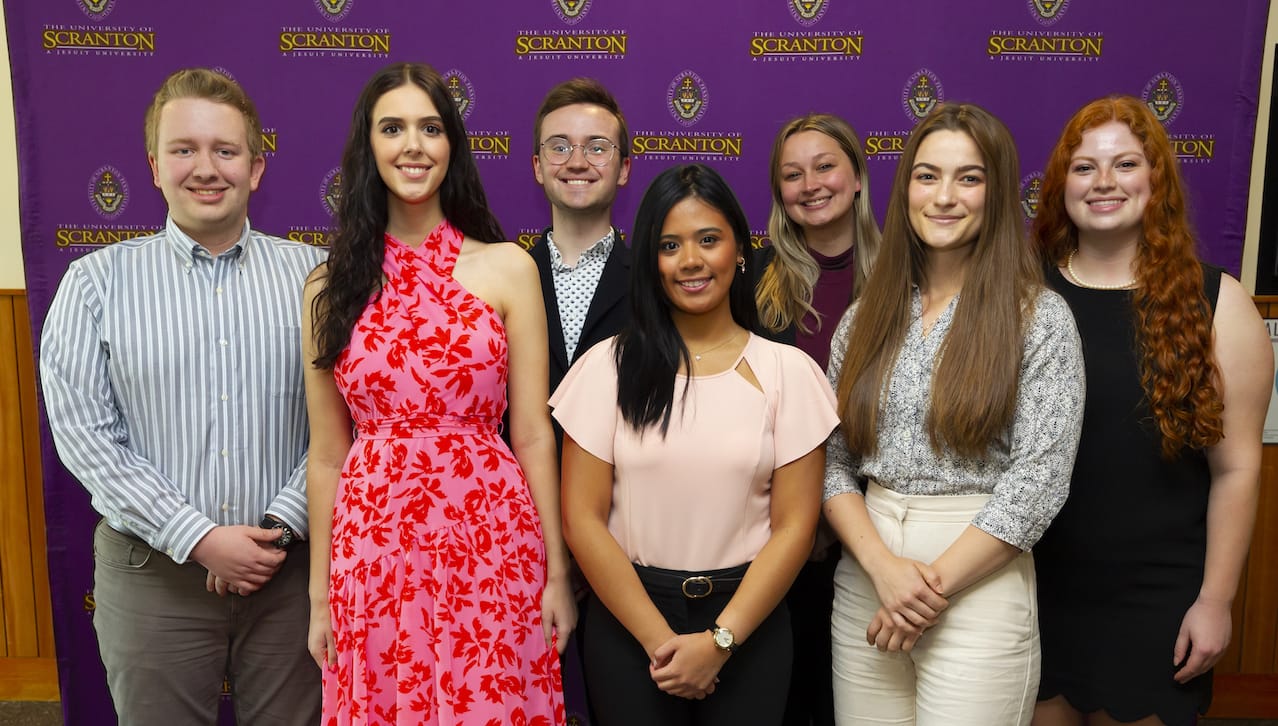Class of 2023 Graduates of Magis Honors Program

Seven members of The University of Scranton’s class of 2023 graduated from its Magis Honors Program in STEM. The program, which began as a pilot program in the fall of 2017, combines the development of STEM knowledge and research techniques with programing to further the students’ understanding of the impact science has on society. The University’s Magis Honors Program in STEM was officially approved as the University’s fifth honors program in 2019.
The Magis Honors Program offers talented students a more intense, interdisciplinary experience of research in science, technology, engineering and mathematics (STEM). Courses taken over four years at Scranton combine a series of seminars on STEM and society with humanities courses. With guidance by faculty mentors, the students in the program develop, present and defend a thesis based on their individual research projects. In addition, the program requires participation in annual community service projects as well as professional development programs.
The following members of Scranton’s class of 2023 graduated as members of the Magis Honors Program in STEM.
Cloe B. Capalongo, Scranton, graduated, magna cum laude, as a biology major. Capalongo worked with faculty mentor Vinny Farallo, Ph.D., assistant professor of biology, on her thesis project.
Angela R. Hudock, Sayre, graduated, summa cum laude, as a biochemistry, cell and molecular biology major. Hudock worked with faculty mentor Michael Fennie, Ph.D., associate professor of organic chemistry, on her thesis project. Hudock was also the recipient of the University's full-tuition Presidential Scholarship.
Taylor N. Moglia, Milford, graduated, summa cum laude, as a neuroscience major. Moglia worked with faculty mentor Michael Fennie, Ph.D., associate professor of organic chemistry, on her thesis project.
Michael Quinnan, Shavertown, graduated, summa cum laude, as a biomathematics major. Quinnan worked with faculty mentor Murong Xu, Ph.D., assistant professor of mathematics, on his thesis project. Quinnan was also the recipient of the University's full-tuition Presidential Scholarship.
Danica May Nichole Ibanez Sinson, Floral Park, New York, graduated, magna cum laude, as a biology and philosophy double major and was a member of the University's Special Jesuit Liberal Arts Honors Program. Sinson worked with faculty mentor Jong-Hyun Son, Ph.D., assistant professor of biology, on her thesis project.
Nathaniel R. Smith, Wilkes-Barre, graduated, summa cum laude, as a neuroscience major and was a member of the University's Undergraduate Honors Program. Smith worked with faculty mentor Marc Seid, Ph.D., professor of biology, on his thesis project.
Julia E. Turnak, Hingham, Massachusetts, graduated, summa cum laude, as a biology and philosophy double major and was a member of the University's Undergraduate Honors Program and its Special Jesuit Liberal Arts Honors Program. Turnak worked with faculty mentor Kara Krieg, Ph.D., assistant professor of biology, on her thesis project.
Janice Voltzow, Ph.D., professor and chair of the Biology Department, serves as the director of the Magis Honors Program in STEM.






